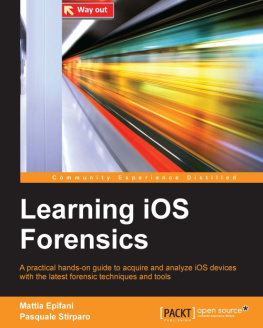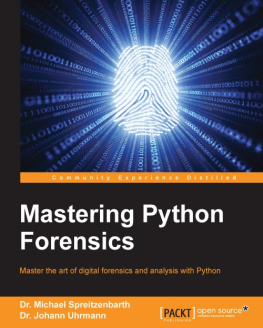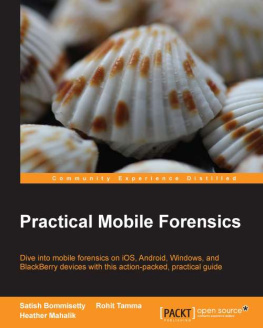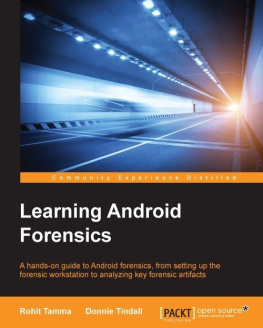Mattia Epifani - Learning iOS Forensics
Here you can read online Mattia Epifani - Learning iOS Forensics full text of the book (entire story) in english for free. Download pdf and epub, get meaning, cover and reviews about this ebook. year: 2015, publisher: Packt Publishing, genre: Home and family. Description of the work, (preface) as well as reviews are available. Best literature library LitArk.com created for fans of good reading and offers a wide selection of genres:
Romance novel
Science fiction
Adventure
Detective
Science
History
Home and family
Prose
Art
Politics
Computer
Non-fiction
Religion
Business
Children
Humor
Choose a favorite category and find really read worthwhile books. Enjoy immersion in the world of imagination, feel the emotions of the characters or learn something new for yourself, make an fascinating discovery.
- Book:Learning iOS Forensics
- Author:
- Publisher:Packt Publishing
- Genre:
- Year:2015
- Rating:3 / 5
- Favourites:Add to favourites
- Your mark:
Learning iOS Forensics: summary, description and annotation
We offer to read an annotation, description, summary or preface (depends on what the author of the book "Learning iOS Forensics" wrote himself). If you haven't found the necessary information about the book — write in the comments, we will try to find it.
A practical hands-on guide to acquire and analyze iOS devices with the latest forensic techniques and tools
About This Book- Perform logical, physical, and file system acquisition along with jailbreaking the device
- Get acquainted with various case studies on different forensic toolkits that can be used
- A step-by-step approach with plenty of examples to get you familiarized with digital forensics in iOS
If you are a digital forensics examiner daily involved in the acquisition and analysis of mobile devices and want to have a complete overview of how to perform your work on iOS devices, this book is definitely for you.
In DetailMobile device forensics relates to the recovery of data from a mobile device. It has an impact on many different situations including criminal investigations and intelligence gathering. iOS devices, with their wide range of functionality and usability, have become one of the mobile market leaders. Millions of people often depend on iOS devices for storing sensitive information, leading to a rise in cybercrime. This has increased the need to successfully retrieve this information from these devices if stolen or lost.
Learning iOS Forensics will give you an insight into the forensics activities you can perform on iOS devices. You will begin with simple concepts such as identifying the specific iOS device and the operating system version and then move on to complex topics such as analyzing the different recognized techniques to acquire the content of the device. Throughout the journey, you will gain knowledge of the best way to extract most of the information by eventually bypassing the protection passcode. After that, you, the examiner, will be taken through steps to analyze the data. The book will give you an overview of how to analyze malicious applications created to steal user credentials and data.
Mattia Epifani: author's other books
Who wrote Learning iOS Forensics? Find out the surname, the name of the author of the book and a list of all author's works by series.





